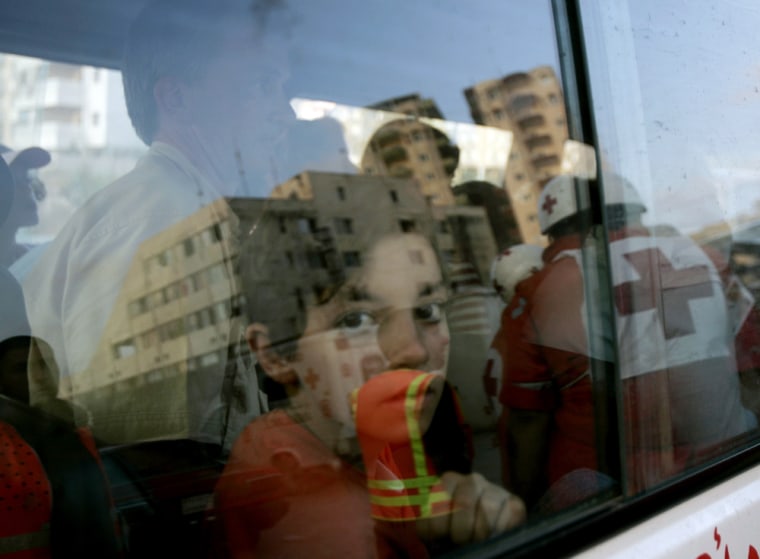TYRE, Lebanon — We joined up with the Lebanese Red Cross on Wednesday as they set off on a race against time and battle-scarred roads to evacuate some of the wounded from Tyre Lebanon to the comparitive safety of Beirut.
The trip south to Tyre showed us a big issue in this conflict: the Israeli bombing of highways. The roads have been targeted to prevent the shipment of more arms to the Hezbollah; however, it makes it extremely difficult for emergency workers to extract the wounded.
And not only did the Red Cross volunteers face treacherous conditions, but they also faced heart-wrenching decisions. Although they found dozens in dire need, they had room for only six in their vehicles. So they did what they always have to do in these situations — take those in the worst condition.
Dangerous roads
The mountainous route from Beirut to Tyre is so narrow in some places that you literally scrape mirrors as cars pass each other. There are a lot of switchbacks and a lot of bumpy roads because the roads have been hit by the bombs. On our drive down, we had to change route repeatedly because of at least eight knocked-out bridges.
It was a modest mission — just three ambulances and one minivan. They want to get a larger group of 20-30 ambulances down here, but without assurances from the Israeli Defense Forces that they can bring in that many and remain safe, they are just going in small groups.
Picking up the wounded
Once we finally reached Tyre, the volunteers immediately began picking up patients. Perhaps the most heart-breaking to see was Smath Said Shahd, a 9-year-old girl who was hit by some munitions while she and her 7-year-old sister were out playing.
Shahd was hit in the chest and abdomen, as well as having some serious damage to her small intestine and her throat. As the Red Cross medics were taking her away, her family kept saying, “Does she look like a soldier? She’s not a soldier. She is just a small child. Why would she be targeted? Why would she be hit?”
Heartache
The incident hit home particularly hard with the mission's leader, a 37-year-old volunteer who gave his name as “Commando.” (He explained that many in the organization use nicknames so that people can’t determine ethnic or religious backgrounds, allowing them to remain apolitical.)
Commando’s four children are taking refuge up in the mountains of Lebanon — and one of them also is a 9-year-old girl. He said it made his heart ache to be picking up Shahd, because it reminded him that it could have been his own daughter, who he hadn't seen for 12 days.
Everyone a target
At the Red Cross headquarters in Tyre, I spoke to Kassem Chaalan, 28, who told me about being in an ambulance that was struck by a missile. When the armament struck the vehicle, he says, it hit the Red Cross symbol on the roof dead-on.
The volunteer thought at first that had died — he said the blast blew him back 15 to 25 feet. “I thought I was just dreaming and that I was dead — there was no way that I was alive,” he said.
Chaalan says he’s lucky to be alive. He has a small wound to his left knee as well as some loss of hearing. His helmet is peppered with shrapnel and his flak jacket is torn in places. Remarkably, the passengers in the ambulance — a child, a man and an elderly woman — all survived, though the man inside the ambulance lost his right leg.
This incident, though, has caused anxiety and anger among the Lebanese Red Cross volunteers, who number about 2,400. They say they were under the impression that they would be safe and point to the Geneva Convention, which says that the Red Cross symbol should prevent them from being targeted. However, they say, not one volunteer has called in to withdraw their services.
